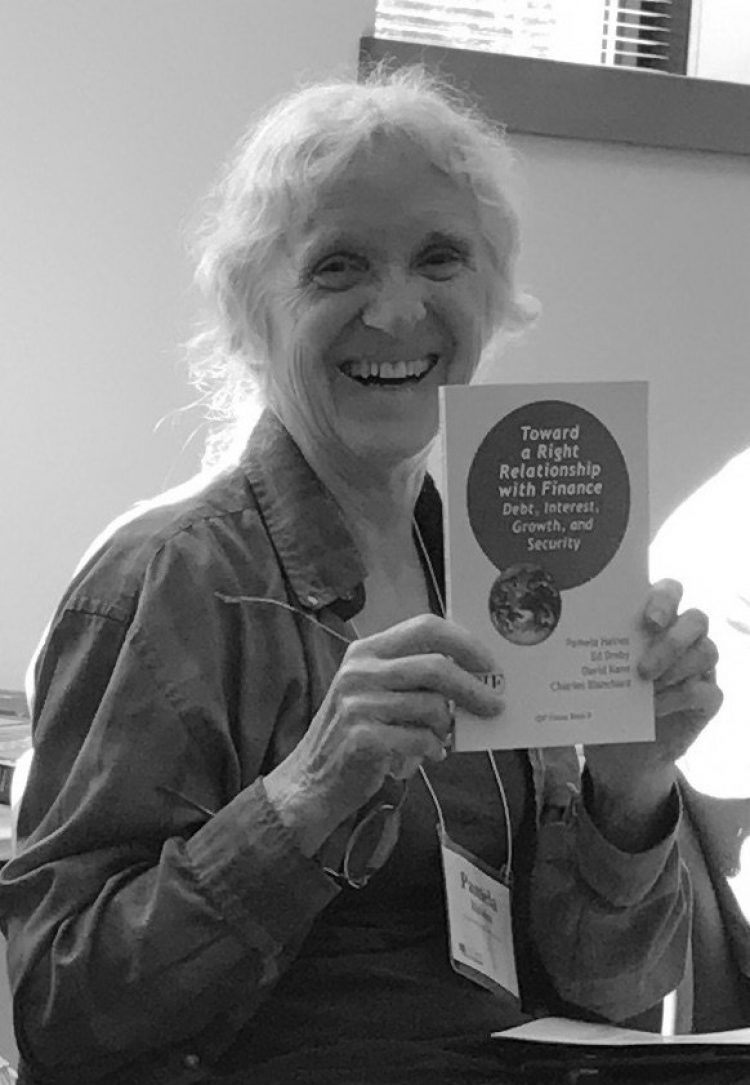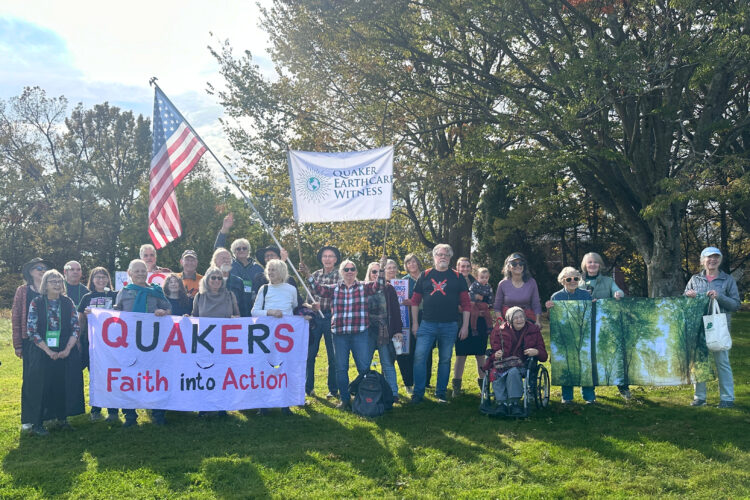Money & Soul: Bringing Our Faith Values to the Economy

By Pamela Haines.
TO THEOLOGIAN WALTER WINK, Spirit is at the core of every institution. These institutions, or Powers, are created with the sole purpose of serving the general welfare of people, and when they cease to do so, their spirituality becomes diseased. The task of the church is to identify these Powers, discern whether they contribute to the common good and, if not, redeem them and call them back to their original ‘divine vocation.’ To call our economy back to its divine vocation of organizing society to provide for livelihood and welfare, while protecting the earth on which it depends, we have to ask big faith-based questions.
What is true wealth? Is it money, infrastructure, natural resources, our fund of common knowledge, our human capacity, our spiritual depth? How can that which we value be increased?
What needs to be equal? Probably not everything—but some things.
What does democracy have to do with economics? Who should decide, and where should control be located? There is probably no simple answer for all situations, but it is a question that cries out to be asked.
How is well-being tracked? What should be measured?

An opportunity to ask these big questions came up at Philadelphia Yearly Meeting in the summer of 2014. We had gone through some very lean and painful years following the great 2008 recession, laying off over a third of our paid staff and slashing program expenses to the bone. After several more years of tight fiscal controls, forced savings, and austerity spending, finally, at annual sessions that summer, we heard the good news:
“Spending is stable; resources are up; income is showing a tendency to rise. If the stock market just continues to grow, we can anticipate more reassuring financial statements for years to come.”
“If the stock market just continues to grow…” That phrase rang in the ears of several of us who were active in our yearly meeting’s Friends Economic Integrity Project. What a paradox! Our yearly meeting depends on growth in the stock market. Yet that growth is a driver of economic inequality and environmental destruction.
A handful of us gathered at the end of Sessions to scratch our heads together. With our endowments so deeply dependent on these investments, and many of us counting as never before on investment for our retirement security, how could we challenge this system with integrity and effectiveness? None of us were trained economists, but we all saw our economic system at the root of many of the problems we are facing, from inequality to climate change. To help puzzle out these issues, several of us took on a writing project that would lead to the book Toward a Right Relationship with Finance: Interest, Debt, Growth and Security, published by the Quaker Institute for the Future.
In the process, I got a much better picture of the radical shift in our economy in the late 1970s, from the strong New Deal and post World War II emphasis on serving the common good to one promoting private gain. Tax rates on the rich plummeted from 91 percent in the 1950s to 28 percent with Reaganomics. Regulations on business, banking, and finance were loosened. The private sector’s influence grew. The system we now find ourselves in—sometimes known as “neoliberal” economics—hearkens back to the laissez-faire era of the Robber Barons.
I learned how our retirement system changed over that period of time. After WWII, retirement security based on the shared systems of job pensions and Social Security was the norm (at least for white men). Since then, it has shifted steadily toward individual retirement accounts—with individual security increasingly dependent on interest from investments.
The connection between interest and debt on the one hand, and growth and inequality on the other, is compelling:
- Virtually all money is created when banks make interest-bearing loans.
- Taking on loans means taking on debt.
- So more money needs to be made in order to pay off the interest on that debt.
- Thus the requirement for economic growth is baked into the system.
- When there were great untapped resources—minerals, forests, topsoil—and easy access to stored sunlight from the past in fossil fuels, such an expansive system could work.
- But it has no future on a spaceship, as Quaker economist Kenneth Boulding so eloquently pointed out.
- Since producing more is linked to using more resources, Earth’s ecological systems are increasingly strained.
- And inequality steadily grows as interest payments make lenders richer and debtors poorer.
It’s a land mine of ethical issues.
First, there is the question about rights. Do we have a right to interest income that we haven’t earned through our own effort? Beneath that question lies a bigger one: Does having anything mean we have a right to it?
Second, there are questions about fairness. Sometimes a loan can be fair for both sides. But should it be easier for people with some assets to get more than for people with no assets to get some? Should people who have not yet begun their work life be in debt? When does debt become indebtedness?
Then there are questions about relationships and connection. What if my gain in economic security involves someone else’s loss? What does inequality—or even a focus on individual security—do to our sense of connection?
And then, of course, there is the big question of what really brings security. Can it come from laying away treasures on Earth?
Building on our confidence that we have a right to speak up about issues of war and peace, the world needs us to step boldly into the arena of economics and apply our faith values to these big hard questions. In the next issue, I will use a framework of the Quaker testimonies to reflect on how to put these faith values into action.
OUR ECONOMY HAS STRAYED far from its divine vocation of organizing society to provide for livelihood and welfare, while protecting the earth on which it depends. As we seek a rightly ordered response, as investors and debtors and workers and citizens—as Friends—the framework of our Quaker testimonies can help.
INTEGRITY
We can’t make much progress without acknowledging the importance of integrity. Clearly it is massively lacking in our current economy and, like the fish in the sea, we cannot exist outside of it. But while a goal of purity may be beyond our reach—and may lead us to spiritual dead ends if we try— that doesn’t mean we need be immobilized or silenced.
One way to start is to take on the discipline of writing our own statements of conscience. What values do you claim in this area of money and economics? To what do you conscientiously object? On what basis? Even if there are things that you do not know or fully understand you can start by looking for a solid place on which to stand. This would be a productive exercise for Meetings to take on together.
SIMPLICITY
Simplicity is central. With an economic and monetary system that depends on continuous growth, more people need to be steadily convinced that they need more things. This requires people who are willing to be defined as consumers and vulnerable to being swayed by advertisers.
So living out our testimony on simplicity with all the intention and power we can muster—and sharing the joy of that choice with others—is part of calling the economy back to its divine vocation of providing for human welfare on a finite earth.
EQUALITY
Equality is endangered by an economy whose underlying dynamic tends to widen class differences. Added to this is the role of racism, and the great transfers of wealth from communities of color to the white world.
What might pull down the accumulation of excessive wealth? The city of Portland, Oregon, for example, has just passed an ordinance that adds a tax to corporations whose CEOs make more than 100 times the average of their workers. (In 1965, the average was 20 to 1. By 2013, this was almost 300 to 1.) Other tax policies could discourage making money from money without contributing anything to the real economy. Similarly we can put our weight behind policies to pull people up out of oppressive debt, such as payday lending, credit card fees, student debt, and underwater mortgages.
We can think even bigger, and support the idea of moving our whole money-creation system out of the for-profit banking sector, as it currently functions in the Federal Reserve.
We can support expansion of the kind of policies that helped create the post-war white middle class. (As this group’s prospects have been eroded by the resurgence of laissez-faire neoliberalism, greater insecurity brings both more commonalities with the poor and oppressed, and more fears that end up targeting those groups.) This might include efforts to raise the minimum wage; support for college education like that of the GI Bill; a revised personal income tax structure; perhaps a guaranteed income, such as that proposed by both Franklin Roosevelt and Richard Nixon.
COMMUNITY
Since our economic system depends on getting people to act individually and on the basis of greed, community is critical to our salvation. Any efforts to retain parts of the economic system in community, or return them to community are part of the solution.
It’s easier to think of community-based ways of managing production and services than community-based ways of managing money, yet credit unions are a wonderful community-owned institution where debt and interest stay in the same closed local system. If I borrow money there, I am borrowing from my neighbors. If I have money there in savings, it is being used to support my neighbors.
We can all revisit our investment choices, moving from screening out negative investments, to actively choosing for positive investments, to investing locally, either in community investment funds or even in specific sectors or businesses.
Focusing even closer in, families or religious communities might choose to buy up student loans and credit-card debt from their members and set up loan repayment agreements with zero or minimal interest rates.
Finally, we can choose to invest in our common security by plain old sharing of wealth (our title to which tends to be pretty shaky) with groups like Right Sharing of World Resources, with their wonderful mission of relieving the burdens of both poverty and materialism.
STEWARDSHIP
With the concept of stewardship evoking separation and control, how can we shift from the idea of “mastery over” and work to understand our place within the ecosystems of which we are a part, and the role we can play as part of the whole that best enhances and maintains that whole? What can this perspective teach us about a healthy and sustainable financial eco-system?
A current practice in agriculture is to use deep and straight ditches to drain water off of fields as efficiently as possible. But it turns out that deep and straight ditches are also efficient in washing away topsoil, eroding banks, and sending agricultural poisons directly into the adjacent water supplies. It turns out that, if you’re thinking in terms of the health of the ecosystem, it’s better to have a very slow and meandering stream that takes its time, replenishes the surroundings, and does a lot of self-cleaning in the process.
Similarly, I’m pretty sure that a healthy financial ecosystem would be slow. There would not be an efficient stream whose goal was to pour stuff out at the end. Rather, as its resources meandered and percolated through the local economy, the health of the local system would be steadily replenished. It’s the difference between a model that extracts and one that generates.
PEACE
Thinking about peace, I remember someone coming back from a demonstration against the war in Iraq and talking about a sign they saw: “What is our oil doing under their sand?” How much of war is fueled by inequality and the demands of a growth economy in a world of increasing scarcity? How much is it fueled by a desire to gain greater control over wealth or productive assets or water? Removing economic injustice from that picture would certainly drain an enormous amount of conflict.
While we are entangled, we are not immobilized, and we need not be silenced. We have many roles—as debtors, investors, community members, citizens—and there are many steps we can take from where we are standing right now. With so many unknowns about the future, the energy we spend second-guessing or judging our choices, or those of others, is mostly wasted. We get to do the best we can, relying on the power of moving forward in faith, making the path by walking.

